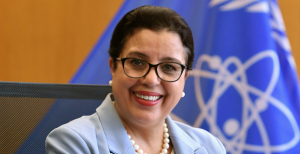Breaking barriers: My path in nuclear science and its peaceful potential
Abstract:
Seventy years ago, in his historic Atoms for Peace speech, President Eisenhower set forth a bold vision: a world where nuclear science would not be confined to military might but instead serve humanity’s greatest needs - eradicating disease, ending hunger, and advancing prosperity. Today, that vision is more relevant than ever. Yet, despite the countless ways nuclear technology transforms lives, misconceptions still overshadow its immense contributions.
In this lecture, I will share my personal journey in nuclear science and explore how its peaceful applications are driving solutions to some of the world’s most pressing challenges.
The impact of nuclear science is already profound and far-reaching. Radiation therapy is critical in the fight against cancer, saving millions of lives each year. In food security, nuclear techniques help eliminate harmful pests, improve soil fertility, and develop climate-resilient crops, ensuring stable food supplies in the face of changing climate conditions. Isotope hydrology enables nations to map and manage groundwater resources, securing safe drinking water for communities worldwide. Nuclear applications are also at the forefront of tracking ocean pollution, reducing industrial emissions, and improving clean energy solutions. In the pursuit of sustainable energy, fusion research is progressing rapidly, offering the possibility of an abundant and carbon-free power source for future generations.
I will also discuss some of the barriers that hinder the advancement of nuclear science - from public scepticism and policy constraints to gaps in awareness that limit its full potential in addressing global challenges. I will highlight the ways in which education, advocacy, international cooperation and diplomacy can help ensure that nuclear technology and its benefits reach the people and communities who need it most.
Biography
Dr Najat Mokhtar was appointed Deputy Director General and Head of the Department of Nuclear Sciences and Applications at the International Atomic Energy Agency (IAEA) on 1 January 2019. She has dedicated her career to expanding the impact of nuclear technology in human health, food and water security, environmental protection, and industrial development. Prior to her appointment, she was Director of the Division for Asia and the Pacific in the Department of Technical Cooperation at the IAEA dedicated to advancing projects on the ground in over 30 countries in the region.
Dr Mokhtar holds a PhD in Nutrition and Endocrinology from Laval University in Canada and has a doctorate in food sciences from the University of Dijon in France. She completed her postdoctoral training as a Fulbright fellow at Johns Hopkins University in the United States of America.
Throughout her professional career, she has contributed to the publication of several books and peer-reviewed publications, and she has worked as a consultant for various organizations and national and international institutions (Ministry of Health, Ministry of Education, WFP, USAID, WHO, UNICEF, FAO). She was mandated by the Moroccan government as national coordinator to develop the "National Nutrition Strategy in Morocco 2011-2019," including training, education, and research. In March 2011, she was elected President of the Moroccan Society of Nutrition.
Dr Mokhtar currently also serves as the Chair of UN-Nutrition, where she facilitates dialogue among Member Agencies to develop joint approaches for addressing global nutrition challenges. Her scientific and technical expertise, associated to her strong leadership allow her to steer the collective and foster enhanced coordination and cohesive action.

Attend the presentation
If you want to attend this presentation at DIFFER, please use the registration form.
Date
Chair
Location
Speaker
Affiliation
Website
Go to the Events page.